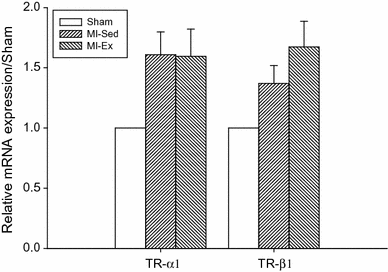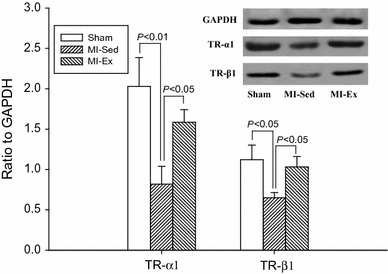Post-myocardial infarction exercise training beneficially regulates thyroid hormone receptor isoforms
- PMID: 29273887
- PMCID: PMC10717031
- DOI: 10.1007/s12576-017-0587-z
Post-myocardial infarction exercise training beneficially regulates thyroid hormone receptor isoforms
Abstract
Thyroid hormone receptors (TRs) play a critical role in the expression of genes that are major determinants of myocardial contractility, including α-myosin heavy chain (α-MHC) and β-MHC. After myocardial infarction (MI), changes in myocardial TRs consistently correlate with changes in thyroid hormone (TH) target gene transcription, and this is thought to play a key role in the progression to end-stage heart failure. Interestingly, post-MI exercise training has been shown to beneficially alter TH-target gene transcription and preserve cardiac function without changing serum TH. Therefore, in this study, we investigated whether mild exercise training alters expression of α1 and β1 TR isoforms in post-MI rats. Seven-week-old male Sprague-Dawley rats underwent coronary ligation or sham operation, and were assigned to 3 groups (n = 10): sham, sedentary MI (MI-Sed), and exercise MI (MI-Ex). Treadmill training was initiated 1 week post-MI, and gradually increased up to 16 m/min, 5° incline, 50 min/day, 5 days/week, and lasted for a total of 8 weeks. Real-time polymerase chain reaction and gel electrophoresis were performed to quantify changes in TR isoforms. Our results illustrated that mRNA expression of TR-α1 and TR-β1 was higher in both MIs; however, protein electrophoresis data showed that TR-α1 was 1.91-fold higher (P < 0.05) and TR-β1 was 1.62-fold higher (P < 0.05) in the MI-Ex group than in the MI-Sed group. After MI, TR-α1 and TR-β1 protein levels are significantly decreased in the surviving non-infarcted myocardium. Moderate-intensity exercise training significantly increases TR-α1 and TR-β1 protein expression, which in turn may upregulate α-MHC and improve myocardial contractile function and prognosis.
Keywords: Exercise training; Myocardial infarction; Thyroid hormone receptors.
Conflict of interest statement
Xiaohua Xu declares that he has no conflict of interest. Wenhan Wan declares that she has no conflict of interest. Michael A. Garza declares that he has no conflict of interest. John Q. Zhang declares that he has no conflict of interest.
Figures


Similar articles
-
Exercise training induced myosin heavy chain isoform alteration in the infarcted heart.Appl Physiol Nutr Metab. 2014 Feb;39(2):226-32. doi: 10.1139/apnm-2013-0268. Epub 2013 Sep 5. Appl Physiol Nutr Metab. 2014. PMID: 24476479
-
Exercise training improves cardiac function-related gene levels through thyroid hormone receptor signaling in aged rats.Am J Physiol Heart Circ Physiol. 2004 May;286(5):H1696-705. doi: 10.1152/ajpheart.00761.2003. Epub 2004 Jan 2. Am J Physiol Heart Circ Physiol. 2004. PMID: 14704232
-
Time-dependent changes in the expression of thyroid hormone receptor alpha 1 in the myocardium after acute myocardial infarction: possible implications in cardiac remodelling.Eur J Endocrinol. 2007 Apr;156(4):415-24. doi: 10.1530/EJE-06-0707. Eur J Endocrinol. 2007. PMID: 17389455
-
Effects of exercise training on brain-derived neurotrophic factor in skeletal muscle and heart of rats post myocardial infarction.Exp Physiol. 2017 Mar 1;102(3):314-328. doi: 10.1113/EP086049. Exp Physiol. 2017. PMID: 28070911
-
Noncanonical Action of Thyroid Hormone Receptors α and β.Exp Clin Endocrinol Diabetes. 2020 Jun;128(6-07):383-387. doi: 10.1055/a-1088-1187. Epub 2020 Apr 24. Exp Clin Endocrinol Diabetes. 2020. PMID: 32330966 Review.
Cited by
-
Effects of Late Aerobic Exercise on Cardiac Remodeling of Rats with Small-Sized Myocardial Infarction.Arq Bras Cardiol. 2021 Apr;116(4):784-792. doi: 10.36660/abc.20190813. Arq Bras Cardiol. 2021. PMID: 33886729 Free PMC article. English, Portuguese.
-
The Beneficial Role of Exercise Training for Myocardial Infarction Treatment in Elderly.Front Physiol. 2020 Apr 24;11:270. doi: 10.3389/fphys.2020.00270. eCollection 2020. Front Physiol. 2020. PMID: 32390856 Free PMC article. Review.
-
Strength training attenuates post-infarct cardiac dysfunction and remodeling.J Physiol Sci. 2019 May;69(3):523-530. doi: 10.1007/s12576-019-00672-x. Epub 2019 Mar 25. J Physiol Sci. 2019. PMID: 30911900 Free PMC article.
-
Early moderate exercise benefits myocardial infarction healing via improvement of inflammation and ventricular remodelling in rats.J Cell Mol Med. 2019 Dec;23(12):8328-8342. doi: 10.1111/jcmm.14710. Epub 2019 Oct 15. J Cell Mol Med. 2019. PMID: 31612566 Free PMC article.
References
MeSH terms
Substances
Grants and funding
LinkOut - more resources
Full Text Sources
Other Literature Sources
Medical
Research Materials

